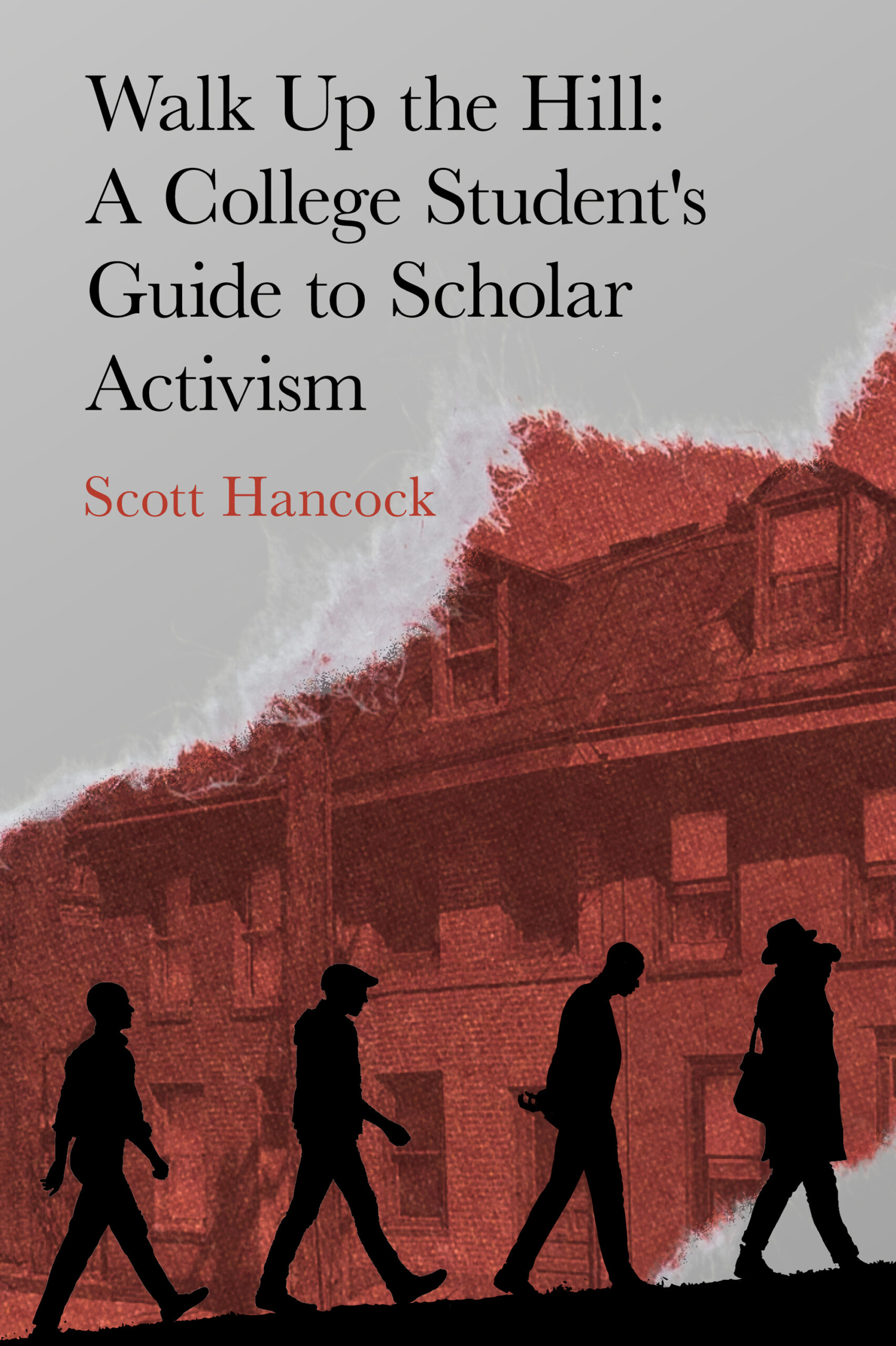
Walk Up the Hill: A College Student’s Guide to Scholar Activism
Scott Hancock‘s Walk Up the Hill is a call to action for aspiring scholar activists, particularly college students, committed to building a more just and equitable society. Blending theory with real-world application, the book explores specific ways for students to engage in activism during their young adult years. Grounded in compelling historical examples, such as the Southern Negro Youth Congress and the Children’s Crusade, it empowers readers to co-produce knowledge, build solidarity, and use media effectively.
Hancock emphasizes that combining scholarship with activism—using research, critical thinking, and academic tools to address real-world issues—enables students to engage more effectively and meaningfully with systemic challenges. With college as a crucible for intellectual and social growth, students are uniquely positioned to blend learning and action in transformative ways. Whether leading a march, collaborating with journalists, or amplifying marginalized voices, Walk Up the Hill offers practical guidance for making a lasting impact.
Winner of the Gettysburg College Distinguished Teaching Award in 2019, Scott himself models the practices of the scholar-activist, as evidenced in this recent profile on CNN.
Now Available!
Walk Up the Hill is available to sample now on VitalSource’s faculty sampling portal.
Hancock, Scott. Walk Up the Hill: A College Student’s Guide to Scholar Activism. State College, PA: Flip Learning, 2025.
ISBN: 979-8-9885449-9-1 – VitalSource Digital-only — $29.00
ISBN: 979-8-9858492-7-1 – Paperback – $24.95 retail (20% bookstore discount)
Bookstores can place digital purchase orders directly via VitalSource’s catalog. For paperback orders, please contact orders@fliplearning.com.

Walk Up the Hill: A College Student’s Guide to Scholar Activism
Scott Hancock‘s Walk Up the Hill is a call to action for aspiring scholar activists, particularly college students, committed to building a more just and equitable society. Blending theory with real-world application, the book explores specific ways for students to engage in activism during their young adult years. Grounded in compelling historical examples, such as the Southern Negro Youth Congress and the Children’s Crusade, it empowers readers to co-produce knowledge, build solidarity, and use media effectively.
Hancock emphasizes that combining scholarship with activism—using research, critical thinking, and academic tools to address real-world issues—enables students to engage more effectively and meaningfully with systemic challenges. With college as a crucible for intellectual and social growth, students are uniquely positioned to blend learning and action in transformative ways. Whether leading a march, collaborating with journalists, or amplifying marginalized voices, Walk Up the Hill offers practical guidance for making a lasting impact.
Winner of the Gettysburg College Distinguished Teaching Award in 2019, Scott himself models the practices of the scholar-activist, as evidenced in this recent profile on CNN.
Now Available!
Walk Up the Hill is available to sample now on VitalSource’s faculty sampling portal.
Hancock, Scott. Walk Up the Hill: A College Student’s Guide to Scholar Activism. State College, PA: Flip Learning, 2025.
ISBN: 979-8-9885449-9-1 – VitalSource Digital-only — $29.00
ISBN: 979-8-9858492-7-1 – Paperback – $24.95 retail (20% bookstore discount)
Bookstores can place digital purchase orders directly via VitalSource’s catalog. For paperback orders, please contact orders@fliplearning.com.
Unique Features of Walk Up the Hill
- Focus on young activists by highlighting relatable examples for college students.
- Connect past to present with historical examples relevant to contemporary movements.
- Provide practical tools for planning events, leveraging media, and sustaining activism.
- Balance optimism with realism by acknowledging challenges and rewards.
- Emphasize relationships to sustain long-term efforts through solidarity and community.
- Encourage learning from history with a Sankofa perspective to inform future action.
- Promote personal well-being by balancing self-care and collective care in activism.
- Ground ideas in evidence through academic rigor and accessible writing.
- Encourage collaborative action by framing activism as a community-centered effort.
- Expand definitions of activism beyond protests to include co-creating knowledge and influencing systems.
Scholar Activism: Why Should Students Care? (Chapter 2)
- Connect academic learning with real-world impact, bridging theory and practice.
- Empower students to address systemic issues such as racial injustice, economic inequality, and climate change.
- Leverage unique perspectives to become change agents in their communities.
- Shape lifelong leadership and problem-solving skills through activism during college.
- Learn from history by seeing how young adults have driven transformative movements.
- Enhance critical thinking and cultivate empathy for diverse perspectives.
- Influence policies and practices by addressing local and global issues.
- Collaborate across disciplines to create richer and more diverse learning experiences.
- Find purpose by making academic work feel more meaningful and relevant.
- Clarify career goals through activism that highlights passion and purpose.
Who is a Scholar Activist? (Compelling Examples from Chapters 3 & 4)
- Tommie Smith and John Carlos: Used their 1968 Olympic protest to highlight systemic injustice.
- Fannie Lou Hamer: Demonstrated the power of persistence in voter registration campaigns.
- CS1950 Movement: College students at the University of Missouri drove systemic change on campus.
- Ja’Nai Harris: Inspired activism at Gettysburg College to combat micro- and macroaggressions.
- Veronica Moeller: Mobilized a thousand-person march in her hometown, showing grassroots impact.
- Anyone can be a scholar activist by bridging knowledge and action for societal benefit.
- Showcase diverse strategies that work both within and outside academic settings.
Nuts & Bolts of Being a Scholar Activist (Chapter 5)
- Co-produce knowledge by working collaboratively with your community.
- Use analytical empathy to understand diverse perspectives and respond effectively to criticism.
- Create clear mission statements to align group efforts and maintain focus.
- Develop sustainable relationships with community members, mentors, and allies.
- Avoid jargon to ensure clarity and inclusivity when communicating with others.
- Plan events effectively by setting specific goals, concise messaging, and clear leadership.
- Prepare for open mics by setting boundaries to maintain purpose and energy.
- Establish measurable outcomes to assess progress and provide direction for future efforts.
- Embrace grunt work like attending meetings or organizing logistics to achieve long-term goals.
- Build solidarity by fostering mutual support and avoiding divisive dynamics.
Using Social & Traditional Media (Chapter 6)
- Leverage social media to amplify activism and expand your community.
- Be precise and accurate in posts to avoid providing ammunition for critics.
- Use platforms strategically to connect activism with scholarship and evidence-based goals.
- Engage diverse audiences by tailoring content for multiple social media platforms.
- Build relationships with journalists to ensure accurate representation in traditional media.
- Tailor your message to the audience of each media outlet for maximum impact.
- Correct misinformation quickly and address distortions about your cause.
- Share knowledge by using media to promote co-creation and critical thinking.
- Create specific calls to action to encourage measurable engagement from your audience.
- Vet online contributions to maintain focus and credibility in your activism.
Request Complimentary Access
This upcoming title will be available on VitalSource’s digital, interactive platform, Bookshelf, which offers the following features:
- LMS single-sign on capabilities.
- Online and offline access.
- A full suite of study tools (highlighting, note-taking, bookmarks, flashcards, etc.).
- Chapter quizzes available for easy upload to any LMS.
- Inclusive Access/First Day eligibility.
- Full compatibility with Section 508 Accessibility Standards.

